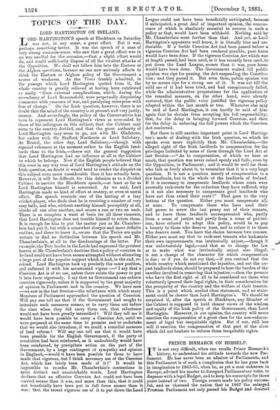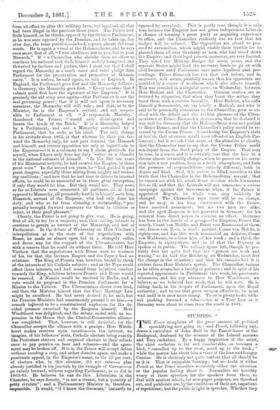PRINCE BISMARCK ON HIMSELF.
IT is not very difficult, when one recalls Prince Bismarck's. history, to understand his attitude towards the new Par- liament. He has never been an admirer of Parliaments, and this Parliament is of such a complexion that he has gone back in imagination to 1863-65, when he, as yet a man unknown in Europe, advised his master to disregard Parliamentary votes, to dispense with a legal Budget, and to keep his conscripts for three years instead of two. Foreign events made his policy success- i ful, and so charmed the nation that in 1867 the enlarged Prussian Parliament not only passed his Budget and desisted , from all effort to alter the military laws, but legalised all that had been illegal in the previous three years. The Prince now finds himself, as he thinks, opposed by the German Parliament, as he was once opposed by the Prussian, and he takes up, day after day, the same position,—indeed, repeats almost the same words. He is again a vassal of the Hohenzollerns, and he says once more, first of all, "I owe obedience not to you, but to your Monarch." If "a Chancellor who shrinks from no effort to continue his national task finds himself unduly hampered and thwarted by factions and parties, then I must say that I shall regard the Monarchy as a much surer and safer pledge than Parliament for the preservation and promotion of German unity." It is useless, he said again, to talk of England. In England, the Parliament goes first and the Monarchy follows ; in Germany, the Monarchy goes first. Every measure that I submit must first have the signature of the Emperor." It is precisely the old story over again,—that Parliament is not the real governing power ; that if it will not agree to necessary measures, the Monarchy will still rule ; and that, as to the Minister, he is the Emperor's servant, and not respon- sible to Parliament at all. "A responsible Ministry," thundered the Prince, " would only disintegrate and loosen the bonds of the Reich." It is a Monarchy helped by a Parliament, and not a Monarchy restrained by a Parliament, that he seeks as his ideal. The only change in his attitude since 1865, is that whereas he then put for- ward the Monarchy only, he now puts forward the Monarch and himself, and resents opposition not only as ingratitude to the Emperor—" it is a calumny to say I claim gratitude for myself, when I have only done my duty --but as a blunder in the national estimate of himself. "In the first ten years of his Ministerial activity, he had created the Empire, by three great wars." In the second ten years, he had guided it past great dangers, especially those arising from mighty and menac- ing coalitions ;" and now that he had time to devote to internal affairs, he could be as successful as in those great enterprises, if only they would let him. But they would not. They were, so far as Liberals were concerned, all partisans, all at heart opposed to Monarchy, all personally hostile to himself,—to him, Bismarck, servant of the Emperor, who had only done his duty, and who so far from claiming a dictatorship, "per- petually brought forward measures for them to criticise or reject, at their good pleasure."
Clearly, the Prince is not going to give way. He is going, first of all, to try for a majority, and, that failing, intends to continue to govern as servant of the Monarchy, and not of Parliament. In the debate of Wednesday on Herr Virchow's interpellation as to the state of the negotiations with Rome, he made an almost open bid in a strangely sullen and fierce way for the support of the Ultramontanes, but with a reserve that he could do without them. He told Herr Virchow that the negotiations with Rome were no business of his, for that the German Empire and the Papacy had no relations. The King of Prussia was, however, bound to think of the interests of his Catholic subjects ; and as the Pope could affect those interests, and had ceased from injurious conduct towards the King, relations between Prussia and Rome would be renewed. A Nuncio would be received in Berlin, and a vote would be proposed in the Prussian Parliament for a Mission to the Vatican. The Ultramontane cheers were loud, and then the Minister hinted that the Civil Marriage Law might be sacrificed. He had never desired it, he said, but the Prussian Ministers had unanimously pressed it on hins,—a remark believed to be a constitutional euphuism for the de- cided pressure exercised by the Emperor himself. Herr Windthorst was delighted, and the debate ended with an im- pression in the House that the Clerical-Conservative alliance was completed. That, however, is still doubtful, for the Chancellor accepts the alliance with a grudge ; Herr Windt- horst makes reserves upon taxation—in the interest, we imagine, of his followers' seats, Catholic electors being exactly like Protestant electors and sceptical electors in their reluct- ance to pay pennies on beer and tobacco—and the agree- ment may be broken off. If it is, the Prince will accept defeat without receding a step, and either dissolve again, and make a passionate appeal, in the Emperor's name, to the 37 per cent. of electors who, in this election, did not vote—a plan already justified in his journals by the example of Cavour—or go calmly forward, without regarding Parliament, as he did in 1863-65. He believes he can do this. Liberalism in the Chamber, be says fiercely, "is not a stream, but a quantity of petty rivulets"; and a Parliamentary Ministry is, therefore, impossible. It would, "if I know the Germans," instantly be opposed by everybody. This is partly true, though it is only true because the Emperor has not given independent Liberals a chance of forming a great party or acquiring experience in office, and the Chancellor evidently has no fear that his budget will be refused. The Opposition are afraid to pro- ceed to extremities, which might enable their terrible foe to placard them all over Germany as men who had voted down the Empire; and their legal powers, moreover, are very limited. They voted the Military Budget for seven years, and the separate States might lend the necessary funds to go on with civil business until Parliament once more legalised past pro- ceedings. Prince Bismarck has run that risk before, and is, moreover, well aware, painfully aware, that his opponents are troubled by a source of weakness, which also affects himself. This was revealed in a singular scene, on Wednesday, between Herr Richter and the Chancellor. German orators are so fettered by etiquettes, that when they burst the withes they burst them with a certain brutality. Herr Richter, who calls himself a Secessionist, or, say briefly a Radical, and who is said to be personally obnoxious to the Chancellor, grew so ex- cited with the debate and the evident pleasure of the Ultra- montanes at Prince Bismarck's statements, that he declared it was well for Germany that the Hohemollerns were not partial to Major Domos, and that the Chancellor's policy would be re- versed by the Crown Prince. Considering the Emperor's state of health, that utterance would have offended an English Par- liament ; but it revealed the secret of the situation so clearly, that the Chancellor rose to say that the Crown Prince could not depart from the fixed policy of the Empire. That may be true, in a sense, and it is certainly true that the heir to a throne almost invariably changes, when he passes on his acces- sion into a new position, lives in a fresh atmosphere, and feels the pressure of responsibilities entirely different, both in degree and kind. Still, it is useless to blind ourselves to the truth that the Chancellor is the Hohenzollerns' servant ; that he cannot act with his usual, fietce decision while his master lies so ill, and that the Liberals will not commence a serious-. campaign against the Government when, if the Prince is appointed Regent, its whole tone may suddenly be..
changed. The Chancellor says there will be no charis,-se,._ and he may, in his long conferences with the Prince,_. have received assurances ; but no two men are alike, and the aged Emperor is too powerful in Germany for hia removal from direct power to exercise no effect. Germany has been in the hands of a group—the Emperor, Prince Bis- marck, Count von Moltke, and Baron von Boon—and of these, one, Baron von Boon, is deal; another, Count von Moltke, is . eighty-one, and has this week nominated an Adlatus, Count von Waldersee, to relieve him of his work ; and a third, the Emperor, is eighty-three, and so ill that the Regency is spoken of in public. The solitary figure left, though he pro- . bably does not quite feel that his "powers are weak and waning," as he told the Reichstag on Wednesday, must feel. the change in the situation ; and that his enemies feel it is.
evidentfrom Herr Richter's speech. The Chancellor, furious. as he often seems, has a faculty of patience ; and in spite of his repeated appearances in Parliament this week, his passionate utterances, and his coy advances to Herr Windthorst, we believe, as we believed last week, that he will wait. He is
falling back, in his despair of Parliament, upon the Royal, authority ; and to use that great weapon effectively, he must. wait until it is once more strong. There is plenty to do. with-- out pushing forward a tobacco-tax or a Poor LIAV as. if ' Germany were about to cease from the world in 1881.







































 Previous page
Previous page